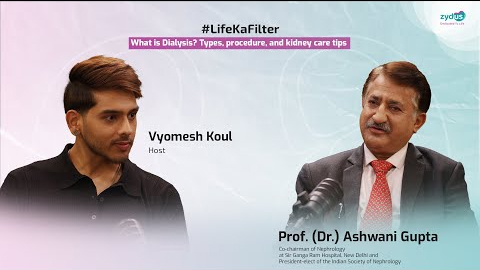Podcast Transcript
What is Dialysis? Cost and the Challenge of Donors
Duration: 00:00:55 – 00:02:03Host: What is dialysis? When kidneys become non-functioning, dialysis is an artificial way to clear waste products from the blood.
Dr. Ashwani Gupta: The cost is between ₹15 and ₹4,000 per month, depending on the hospital and city.
Host: Has the government done anything to help middle-class patients?
Dr. Ashwani Gupta: Hospitals must treat 10% of patients free of cost. But we have 100,000 transplant recipients and only thousands of donors. More donor awareness is needed.
Host: If more people volunteered as donors, it would reduce suffering for many.
Financial Burden of Kidney Disease
Duration: 00:02:03 – 00:03:01Host: The hardest part of kidney disease is the cost. Ninety percent of dialysis patients struggle financially, and transplants cost lakhs.
Host: We are honored to welcome Professor Dr. Ashwani Gupta, Co-chairman of Nephrology at Sir Ganga Ram Hospital, New Delhi.
The Biological Role of Kidneys and How Dialysis Works
Duration: 00:03:01 – 00:04:20Host: Dr. Ashwani Gupta, what exactly do kidneys do?
Dr. Ashwani Gupta: Kidneys are blood purifiers. As our body produces waste—urea, creatinine, phosphorus, acid—it passes through urine. Kidneys filter out this waste and regulate water./n When kidneys lose function over the years, dialysis is needed to artificially purify the blood.
Dialysis Cost Variation and Government Support
Duration: 00:04:20 – 00:05:40Host: So what does dialysis cost in India?
Dr. Ashwani Gupta: ₹15 to ₹400 per session, with 8-10 sessions per month. Costs vary by location and quality of care.
Host: Has the government started any program to reduce the burden?
Dr. Ashwani Gupta: Yes, under the National Health Mission, the Pradhan Mantri National Dialysis Program was launched in 2016./n It provides free hemodialysis and peritoneal dialysis to those below the poverty line. 1,575 centers with 10,800 machines exist nationwide. Last year, 2.95 million patients availed free dialysis.
Kidney Transplants: Demand, Global Comparison, and Donor Shortage
Duration: 00:05:40 – 00:08:46Host: Why is there a shortage of donors in India?
Dr. Ashwani Gupta: Every year, India needs about 200,000 kidneys (new end-stage cases), but only 13,000–14,000 transplants occur./n According to global data—USA did 44,000, China 20,000, India ranks third with 13,270. India leads in live donor transplants, but only 13% are from deceased donors./n If we increase this to 20–50%, it could double the annual transplant numbers.
Host: If even 10% of road accident deaths resulted in donations, thousands of kidneys, livers, and hearts could be available. Increasing donations may not totally solve the need, but progress is possible.
Transplant Costs and Pre-Transplant Dialysis
Duration: 00:08:46 – 00:10:58Host: What does a kidney transplant cost?
Dr. Ashwani Gupta: In private hospitals, ₹8–10 lakh; in government hospitals, ₹4–5 lakh. This covers donor tests, recipient surgery, hospital stay, and medicines./n With pre-transplant dialysis, the total cost can approach ₹12 lakh. Shorter dialysis periods before transplant (2–3 months) are best.
Who Can Legally Donate and Aftercare Costs
Duration: 00:10:58 – 00:13:44Host: Who is allowed to donate a kidney?
Dr. Ashwani Gupta: Legally, near relatives (parents, siblings, spouse, grandparents, grandchildren) and some extended (cousins, uncles, aunts, with DNA/document proof) can donate. Every transplant goes through an authorization committee.
Host: Is there government support for transplant costs?
Dr. Ashwani Gupta: Insurance sometimes covers some expenses, but free transplants are rare. Medication after transplant can cost ₹8,000–₹10,000 per month.
Transplant Patient (via Host): Even after transplant, patients need to take immunosuppressants and other medicines their whole life, costing lakhs over the years.
The Role of Insurance in Dialysis and Transplant
Duration: 00:13:44 – 00:16:42Host: Does insurance cover dialysis and transplant?
Dr. Ashwani Gupta: If pre-existing conditions (diabetes, hypertension) are declared at the start, insurance covers future dialysis and transplant. Otherwise, claims are rejected.
Accessing Free Dialysis and Government Schemes
Duration: 00:16:42 – 00:20:24Host: Where can you get free dialysis?
Dr. Ashwani Gupta: Under EWS or BPL schemes, any hospital must treat 10% patients free./n The PM National Dialysis Program lists centers in all districts. Some NGOs also offer free or low-cost dialysis (e.g., Tanker Foundation, Jain Foundation in Mumbai). You must follow the application rules and be eligible.
Post-Transplant Lifestyle Changes and Mask Usage
Duration: 00:20:24 – 00:25:49Host: What lifestyle changes are required after transplant?
Dr. Ashwani Gupta: Patients must stop seeing themselves as “patients” and live healthy lives. Take immunosuppressants regularly (reject foreign kidney otherwise), maintain discipline with medicines, and avoid risky foods./n For 3 months post-op, high doses require semi-quarantine and masks to avoid infections, especially in crowded places./n Wearing masks has become common post-pandemic—adopt this during infection waves, but a healthy lifestyle is key.
India’s Kidney Healthcare System: Global Comparison
Duration: 00:25:49 – 00:30:24Host: How does Indian kidney healthcare compare globally?
Dr. Ashwani Gupta: India has world-class expertise and medicines, on par with developed countries. Patients can see nephrologists directly, unlike in Western countries, that require initial GP visits./n India is ranked third in global kidney transplants and first for live donors, but increasing deceased donor rates can put India at the top.
Donor Precautions and Rural Access
Duration: 00:30:24 – 00:33:52Host: What should kidney donors do for health?
Dr. Ashwani Gupta: Donors should have annual checkups and manage blood pressure and protein intake (8g/kg body weight). Rural areas now have two dialysis centers per district under the national program. It’s not possible to cover every village yet, but access is improving.
Health Checkups, Diet, and Prevention
Duration: 00:33:52 – 00:38:24Host: What are your recommendations for kidney health prevention?
Dr. Ashwani Gupta: Begin yearly health checkups after age 30 (earlier than the old advice of after 40) due to early onset of diabetes, hypertension, and cardiac issues./n Maintain a healthy diet and lifestyle—avoid frequent fast food and processed foods, which contain harmful fats and preservatives. Youth should prioritize health, avoid extreme diets, and supplements./n For kidney patients: restrict protein (6g/kg if function below 50%), maintain calories (30–35 kcal/kg ideal weight), restrict phosphorus and potassium when needed—not blanket food bans. Eat healthy, stay proactive, and prevention is better than cure.



